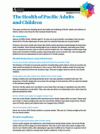This brief paper presents key findings about the health and wellbeing of Pacific adults and children in 2011/12. These results come from the New Zealand Health Survey.
Methodology
Overview of key findings
Health behaviours and risk factors
- About 14% of Pacific children are given solid food before four months of age. This is higher than the national average
- Pacific adults and other adults have similar levels of fruit intake. However, Pacific adults are less likely to eat at least three servings of vegetables each day, and are also less likely to be physically active.
- One in five Pacific children and three in five Pacific adults are obese. These rates are higher than the national averages.
- One in four Pacific adults smoke.
Health status and conditions
- Diabetes disproportionately affects Pacific adults. One in ten Pacific adults have been diagnosed with diabetes.
- One in ten Pacific adults experienced psychological distress in the past four weeks. This is much higher than the national average.
Access to health care
- Cost prevented 17% of Pacific adults, and 7% of Pacific children, from visiting a GP when they needed to, in the past 12 months.
- Over one in ten Pacific adults and children did not collect a prescription item in the past 12 months due to the cost.
- Only one in three (33%) Pacific adults (with natural teeth) had visited a dental health care worker in the past 12 months.
- Pacific adults and children were more likely than other people to have had a tooth removed due to poor oral health in the past 12 months.

